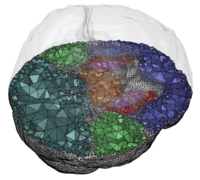Meshing interfaces of multi-label data with Delaunay refinement

|
In medical imaging, the generation of surface representations of anatomical objects obtained by labeling images from various modalities, is a critical component for visualization, simulation, and analysis. The interfaces between labeled regions can meet at arbitrary angles and with complex topologies, causing most automatic meshing algorithms to fail. We apply a recent Delaunay refinement algorithm to generate high quality triangular meshes that approximate the interface surfaces. This algorithm has proven guarantees for meshing piecewise-smooth shapes and its implementation overhead is low. Consequently, the approach is applicable to labeled datasets generated from binary segmentations as well as from probabilistic segmentation algorithms. We show the effectiveness of this technique on data from a variety of medical fields and discuss its ability to control the quality and size of the output meshes. The same algorithm can be used to generate tetrahedral meshes of the segmentation space. |
[DOI/EE link]
@article{DJL12,
author = {Tamal K. Dey and Firdaus Janoos and Joshua A. Levine},
ee = {http://dx.doi.org/10.1007/s00366-011-0217-y},
journal = {Engineering with Computers},
month = {1},
number = {1},
pages = {71--82},
publisher = {Springer London},
title = {Meshing interfaces of multi-label data with {D}elaunay refinement},
volume = {28},
year = {2012}
}